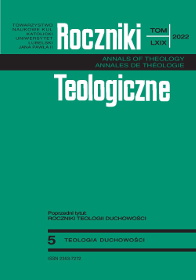Psychologia kontemplacyjna Geralda Gordona Maya (1940–2005)
Abstrakt
Artykuł przedstawia główne koncepcje na styku psychologii i teologii duchowości w pracach Geralda Gordona Maya (1940–2005), przyrodniego brata bardziej znanego psychologa egzystencjalnego Rollo Maya. Ponieważ idee Geralda Maya nie przeniknęły do głównego nurtu psychologii religii oraz teologii duchowości, w niniejszym tekście autor wskazuje kilka możliwych przyczyn takiego stanu rzeczy. Prezentuje jednocześnie istotne elementy spuścizny Maya, ukazując go jako oryginalnego badacza pracującego na granicy psychologii i teologii duchowości o bardzo wnikliwym spojrzeniu na człowieka, którego idee były prawdopodobnie zbyt zaawansowane na swój czas. Aby argumentować na rzecz tej tezy, rozpoczynając od diagnozy instrumentalizacji duchowości we współczesnym społeczeństwie, zostały przedstawione zręby psychologii i teologii kontemplacyjnej Maya, czyli unikalne ujęcie doświadczenia mistycznego, opis duchowych pragnień człowieka oraz ich potencjalny owoc, którym jest całkowite poddanie się Bogu.
Bibliografia
Alsdurf, James. “Review of Addiction and Grace”. Christianity Today 33 (May 12, 1989).
Brussat, Frederic & Mary Ann. “The Dark Night of the Soul. A Psychiatrist Explores the Connection Between Darkness and Spiritual Growth”. Spirituality & Practice. Accessed 11.05.2021. https://www.spiritualityandpractice.com/book-reviews/view/8234/the-dark-night-of-the-soul.
Brussat, Frederic & Mary Ann. “The Wisdom of Wilderness Experiencing The Healing Power of Nature”. Spirituality & Practice. Accessed 11.05.2021. https://www.spiritualityandpractice.com/book-reviews/view/16928/the-wisdom-of-wilderness.
Christian, Gina. “Review of The Wisdom of Wilderness”. Library Journal July 1 (2006): 81.
James, William. The Varieties of Religious Experience. New York: Seven Treasures Publications, 1990.
Jastrzębski, Andrzej. Homo Theomorphicus et Theophoricus. Receptive-Responsive Theory of Spirituality. Leuven–Paris–Bristol: Peeters, 2019.
Jastrzębski, Andrzej. „Uzależnienie a łaska”. In: Spiritualitas, ed. Jan K. Miczyński. Vol. 2: Wyzwolenie i modlitwa, 113–124. Lublin: Wydawnictwo KUL, 2016.
Kelly, Jacques. “Dr. Gerald Gordon May, 64, psychiatrist for prison system, author and teacher”. The Baltimore Sun, April 12(2005). Accessed 10.05.2021. https://www.baltimoresun.com/news/bs-xpm-2005-04-12-0504120026-story.html.
May, Gerald G. Addiction and Grace. Love and Spirituality in the Healing of Addictions. New York: HarperCollins, 1988.
May, Gerald G. Care of Mind/Care of Spirit. Psychiatric Dimensions of Spiritual Direction. San Francisco: Harper & Row, 1992.
May, Gerald G. The Awakened Heart: Living beyond Addiction. New York: HarperCollins, 1993.
May, Gerald G. Will and Spirit. A Contemplative Psychology. New York: HarperCollins, 1987.
May, Gerald G. 1940-2005. Accessed 10.05.2021. https://www.encyclopedia.com/arts/educational-magazines/may-gerald-g-1940-2005.
Pargament, Kenneth I. The Psychology of Religion and Coping: Theory, Research, Practice. New York: The Guilford Press, 1997.
Tacey, David. The Spirituality Revolution: The Emergence of Contemporary Spirituality. London: Brunner-Routledge, 2004.
Taylor, Charles. The Ethics of Authenticity. Cambridge: Harvard University Press, 2003.
Underhill, Evelyn. Mysticism: A Study of the Nature and Development of Man’s Spiritual Consciousness. Santa Cruz: Evinity, 2009.
Young, J. Scott, and Craig S. Cashwell. “Integrating spirituality and religion into counseling: An introduction”. In: Integrating spirituality and religion into counseling: A guide to competent practice, eds. J. Scott Young and Craig S. Cashwell, 1–24. Alexandria: American Counseling Association, 2011.
Copyright (c) 2022 Roczniki Teologiczne

Utwór dostępny jest na licencji Creative Commons Uznanie autorstwa – Użycie niekomercyjne – Bez utworów zależnych 4.0 Międzynarodowe.





